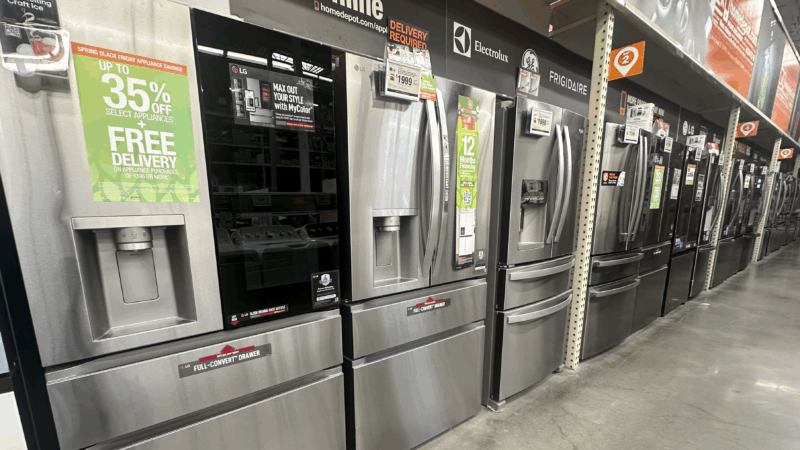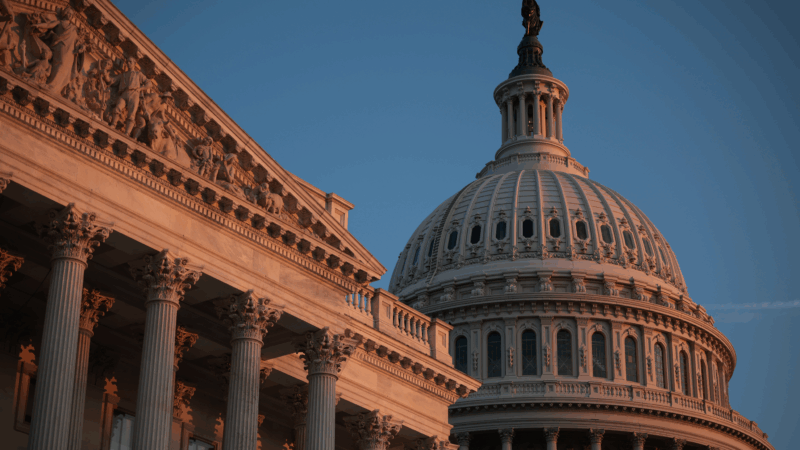Home Depot doesn’t plan to raise prices due to tariffs. But some items may disappear
Home Depot doesn’t plan to raise prices broadly as a result of new tariffs, executives said on Tuesday, but some product options may disappear from store shelves if extra import costs make them not worth it.
The country’s largest home improvement chain weighed in during a call with investors about its earnings report, just days after Walmart drew President Trump’s ire with a warning that his sweeping import taxes are pushing the world’s largest retailer to increase its typically low prices.
“We don’t see broad-based price increases for our customers at all going forward,” said Billy Bastek, Home Depot’s merchandising chief, speaking on Tuesday’s call.
But some individual Home Depot prices may increase, and some products choices might have to change: “There’s items that we have that could potentially be impacted from a tariff that, candidly, we won’t have going forward,” Bastek said. “There’ll be some things that don’t make sense that just end up going away.”
Home Depot executives acknowledged their advantageous position in the retail world: The chain is massive, with tremendous power in the market. It already sources more than half of its items from the U.S. Unlike Walmart, it doesn’t sell food and has a higher average receipt.
Since Trump imposed tariffs on Chinese products during his first term, Home Depot has pushed suppliers to diversify where they source items from. By mid-2026, the company expects to purchase no more than 10% of its products from any single foreign country. In fact, Home Depot hopes its steady prices in the coming months will help it steal shoppers from other retailers, executives said during the call.
Many companies alarmed about prices
The direct commitment to not raising prices sets Home Depot apart from many retailers —large and small — who say they cannot afford to absorb new tariffs.
Under a current temporary deal, U.S. tariffs on Chinese imports sit at 30% from 145% previously. All global imports face a new 10% tariff. Trump has said that foreign countries should pay that fee, but it gets charged to U.S. companies when they take possession of their imported goods.
Walmart last week became the largest company to flag it would raise prices as a result of tariffs, starting this month and continuing into the summer. That drew a scathing social-media post from Trump, saying that Walmart, along with China, should “EAT THE TARIFFS” instead of passing the cost onto customers.
Walmart CEO Doug McMillon had told investors on Thursday that the company was already eating some of the tariff costs, as were its suppliers. It was also shifting costs in other ways to avoid raising prices on food.
“But given the magnitude of the tariffs,” McMillon said, “we aren’t able to absorb all the pressure given the reality of narrow retail margins in retail.”
The Trump administration also previously accused Amazon of “hostile and political” moves after news reports suggested the retailer might display new tariff costs on its low-cost marketplace called Amazon Haul. Following a phone call between Trump and founder Jeff Bezos, Amazon said it never had such a plan at all.
A few days later, Trump threatened to put a 100% tariff specifically on Mattel’s products, after the Barbie maker said it might have to raise prices on some U.S. toys because of tariffs.
The resilient home improvement market
Home Depot, so far, has not faced big new costs from additional lumber tariffs, thanks to a separate deal with Canada. And executives have touted the resilience of their typical shopper — a homeowner with an average income of $110,000.
“We have a very different customer and a very different sort of use case for expenditure in home improvement,” CEO Ted Decker told investors. “Our customer is in a good spot right now.”
The home improvement chain reported U.S. sales rising 0.2% and shopping transactions up 2.1% in the latest quarter, as people undertook more smaller-scale projects. The U.S. housing slump and high mortgage rates still have many people delaying major renovations.
But Decker still argued that the U.S. economy was “well past” the worst forecasts, including warnings of a possible recession, in part thanks to strong employment levels, steadier inflation and lower gas prices.
On Wednesday, rival Lowe’s is expected to address tariffs when it reports earnings. Also on tap is a report from Target, which historically relies on more people buying clothes, cosmetics and other non-necessities that often get skipped when shoppers tighten their budgets.
Team USA faces tough Canadian squad in Olympic gold medal hockey game
In the first Olympics with stars of the NHL competing in over a decade, a talent-packed Team USA faces a tough test against Canada.
PHOTOS: Your car has a lot to say about who you are
Photographer Martin Roemer visited 22 countries — from the U.S. to Senegal to India — to show how our identities are connected to our mode of transportation.
Looking for life purpose? Start with building social ties
Research shows that having a sense of purpose can lower stress levels and boost our mental health. Finding meaning may not have to be an ambitious project.
Sunday Puzzle: TransformeR
NPR's Ayesha Rascoe plays the puzzle with listener Joan Suits and Weekend Edition Puzzlemaster Will Shortz.
Danish military evacuates US submariner who needed urgent medical care off Greenland
Denmark's military says its arctic command forces evacuated a crew member of a U.S. submarine off the coast of Greenland for urgent medical treatment.
Only a fraction of House seats are competitive. Redistricting is driving that lower
Primary voters in a small number of districts play an outsized role in deciding who wins Congress. The Trump-initiated mid-decade redistricting is driving that number of competitive seats even lower.






